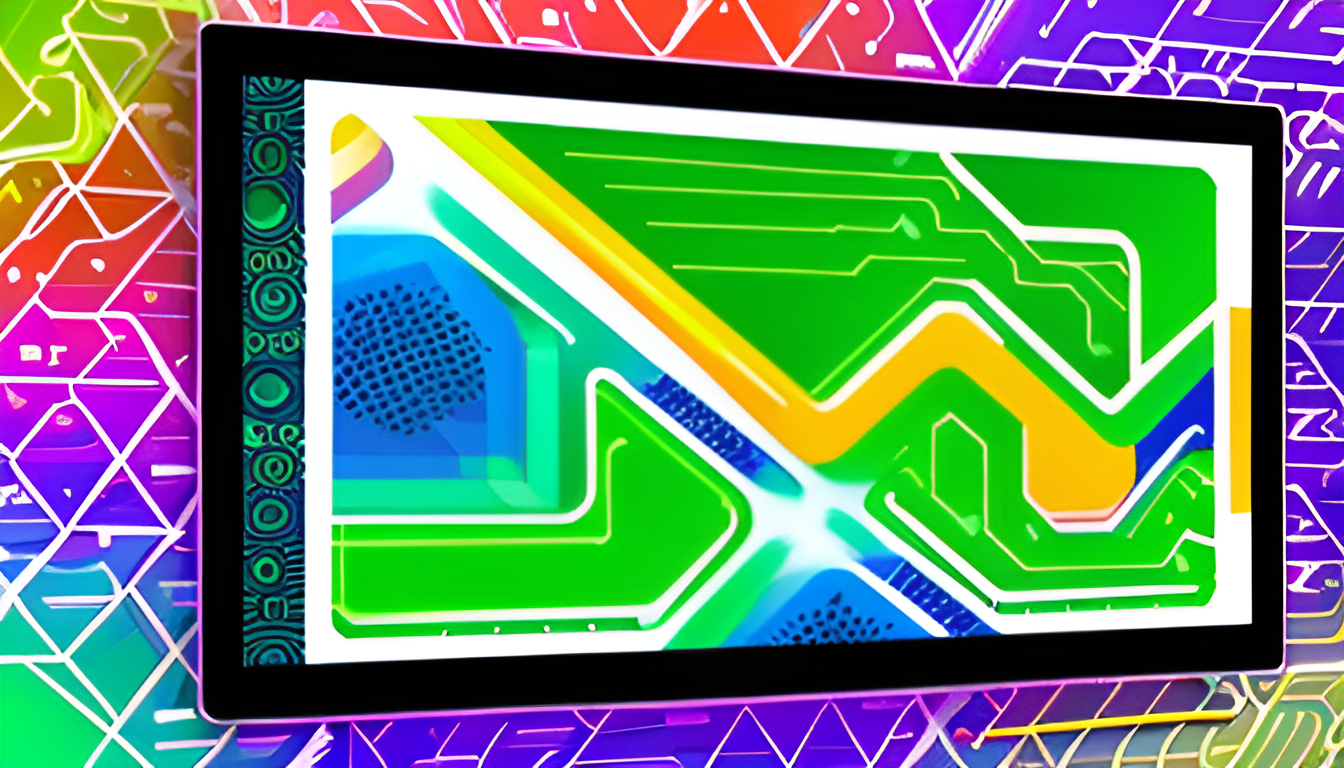How AI-Generated Content Is Shaping Online Trends

The digital landscape is undergoing a transformative shift, and at the heart of this evolution is AI-generated content. This technology is not just a passing trend; it’s a game-changer that is redefining how we create, share, and consume information online. Imagine a world where content is tailored to your preferences, generated in real-time, and constantly evolving to meet your needs. That’s the power of AI!
As we delve deeper into this phenomenon, it’s essential to recognize that AI is not merely a tool for automation. It acts as a catalyst for creativity, enabling writers, marketers, and businesses to produce content that resonates on a personal level. Think about it: when was the last time you felt truly connected to a piece of content? AI is here to bridge that gap, offering insights that help creators understand their audience better than ever before.
Moreover, the implications for marketing strategies are profound. With AI, marketers can analyze vast amounts of data to uncover trends and preferences, allowing for highly personalized campaigns. This means that your ads are not just random shots in the dark; they are finely tuned messages crafted to engage you specifically. It’s almost like having a conversation with a friend who knows you well—how refreshing is that?
However, while we celebrate the benefits, we must also address the challenges that come with AI-generated content. Questions of quality, authenticity, and ethics loom large. Are we sacrificing the human touch for efficiency? As we navigate this new terrain, it’s crucial to find a balance that honors both innovation and integrity.
In conclusion, the rise of AI-generated content is reshaping online trends in ways we are just beginning to understand. It offers exciting possibilities for creativity and engagement, but it also requires us to be vigilant about the implications of its use. As we move forward, one thing is clear: the future of content creation is here, and it’s powered by AI.
The Rise of AI in Content Creation
In today’s digital age, AI technology has completely transformed the way content is created. Gone are the days when crafting a blog post or a marketing campaign required countless hours of brainstorming and revisions. Now, with the help of AI, content creation is not only faster but also more tailored to the specific needs of various audiences. Imagine having a tool that can analyze trends and preferences in real-time, allowing creators to produce content that resonates deeply with their target demographic. This is the power of AI.
One of the most remarkable aspects of AI in content creation is its ability to generate personalized outputs. For instance, AI algorithms can sift through extensive data sets to understand what types of content engage users the most. This means that whether you are a small business owner or a large corporation, you can create content that speaks directly to your audience’s interests and needs.
Additionally, AI tools can assist in generating ideas and even drafting content. Think of it as having a creative partner who works tirelessly alongside you. This collaboration between human creativity and AI efficiency leads to a dynamic content creation process that produces engaging narratives and diverse perspectives. It’s like having a brainstorming session with a supercharged assistant that never runs out of ideas!
However, it’s important to note that while AI enhances content creation, it doesn’t replace the human touch. The best results come from a blend of AI capabilities and human intuition. As we embrace this technology, we must also consider how to maintain authenticity and quality in our content. After all, the digital landscape thrives on genuine connections, and AI is here to help us forge those connections more effectively than ever before.
Impact on Marketing Strategies
In the rapidly evolving digital world, AI-generated content is becoming a game-changer for marketers. Imagine having a tool that not only speeds up content production but also tailors messages to specific audiences. That’s the power of AI! By harnessing this technology, marketers can create campaigns that resonate more deeply with consumers, leading to higher engagement rates and conversions.
One of the most significant advantages of AI in marketing is its ability to analyze data. This means marketers can identify trends and preferences that were previously difficult to spot. For instance, AI can sift through vast amounts of consumer data to uncover insights that inform content strategies. This data-driven approach allows businesses to make informed decisions, ensuring their marketing efforts are aligned with what their audience truly wants.
Moreover, AI enhances the personalization of content. When consumers receive messages that speak directly to their interests and needs, they are more likely to engage. Here’s how AI achieves this:
- Analyzing user behavior and preferences
- Creating tailored content recommendations
- Optimizing communication timing for maximum impact
This level of personalization fosters a stronger connection between brands and their audiences, which is crucial in today’s competitive landscape.
Another remarkable aspect of AI in marketing is automation. By automating content distribution, businesses can ensure that their messages reach the right people at the right time. This not only maximizes visibility but also reduces the manual workload for marketers, allowing them to focus on more strategic tasks. Imagine a world where your marketing team spends less time on logistics and more time on creativity!
However, it’s important to note that while AI offers numerous benefits, it also presents challenges. Marketers must remain vigilant about maintaining quality and authenticity in their content. Striking a balance between automation and the human touch is essential for sustainable success in this new era of marketing.
Personalization and User Engagement
In today’s digital landscape, personalization has become the secret sauce for engaging users effectively. Imagine walking into a store where the salesperson knows your name and suggests products tailored just for you. That’s the kind of experience AI-generated content aims to replicate online. By analyzing user data, preferences, and behaviors, AI tools can create content that resonates on a personal level, making users feel valued and understood.
One of the most striking advantages of AI in content creation is its ability to deliver tailored experiences. For instance, when you visit a website, AI algorithms can curate articles, videos, and recommendations that match your interests. This level of customization not only fosters a deeper connection with the audience but also encourages them to spend more time engaging with the content. In fact, studies show that personalized content can increase user engagement by up to 80%!
Moreover, the integration of AI allows marketers to utilize real-time data to adjust content strategies dynamically. This means that if a particular topic is trending, AI can quickly generate relevant content that aligns with current interests, ensuring that users are always presented with the most engaging and timely information. As a result, brands can maintain a continuous conversation with their audience, enhancing overall user satisfaction.
However, it’s not just about the numbers; it’s about creating an emotional connection. Personalized content can evoke feelings, drive actions, and build loyalty. For example, a user who receives personalized emails or notifications about their favorite products is more likely to return to a brand, creating a cycle of engagement that benefits both parties.
In summary, the fusion of AI and personalization is revolutionizing user engagement. By delivering content that speaks directly to individual preferences, brands can create memorable experiences that keep users coming back for more. As we continue to embrace this technology, the possibilities for deeper connections and enhanced interactions are truly limitless.
Data-Driven Insights
In today’s fast-paced digital world, have become the backbone of successful content strategies. AI technology excels at analyzing vast amounts of data, transforming raw numbers into actionable insights that businesses can leverage to enhance their content creation processes. Imagine trying to navigate a maze without a map; that’s what content creators face without the guidance of data. AI acts as that map, revealing the best paths to take based on consumer behavior and preferences.
By utilizing AI tools, companies can identify key trends and patterns that inform their content strategies. For instance, AI can help pinpoint which topics resonate most with audiences, allowing marketers to tailor their content accordingly. This is not just about guessing what might work; it’s about making informed decisions based on empirical evidence. The ability to analyze audience interactions, engagement rates, and feedback leads to a more refined approach to content creation.
Furthermore, businesses can benefit from real-time analytics provided by AI. This means that content can be adjusted on the fly, ensuring that it remains relevant and engaging. For example, if a particular blog post is gaining traction, AI can suggest related topics or formats that could capitalize on that momentum. This agility is crucial in a landscape where trends can change overnight.
To illustrate the impact of data-driven insights, consider the following table that highlights key benefits:
| Benefit | Description |
|---|---|
| Enhanced Targeting | AI helps identify specific audience segments, allowing for tailored content that speaks directly to their needs. |
| Improved Engagement | By understanding what content performs best, businesses can create more engaging and relevant material. |
| Efficient Resource Allocation | Data insights allow companies to allocate resources more effectively, focusing on high-impact content. |
In conclusion, the integration of data-driven insights through AI not only enhances content strategies but also fosters a deeper connection between brands and their audiences. As businesses continue to harness the power of data, they will unlock new opportunities for engagement and growth in the digital arena.
Automation of Content Distribution
In today’s fast-paced digital world, has become a game-changer for marketers. Imagine trying to juggle multiple platforms, posting at optimal times, and ensuring your audience sees your content—all while managing your daily tasks. Sounds overwhelming, right? That’s where AI steps in, making this process not just manageable but incredibly efficient.
By utilizing AI-driven tools, marketers can automate the scheduling and distribution of content across various channels. This means content can be delivered to the right audience at the right time without the constant manual effort. Think of it as having a personal assistant who never sleeps—always working behind the scenes to maximize your reach. For instance, AI can analyze user behavior, determining when your audience is most active and adjusting your posting schedule accordingly.
Moreover, automation allows for consistent engagement. With AI, you can set up campaigns that run autonomously, ensuring that your brand remains visible even when you’re focused on other priorities. This leads to:
- Increased Visibility: Your content reaches audiences when they’re most likely to engage.
- Reduced Workload: Less manual posting means more time for strategy and creativity.
- Enhanced Analytics: AI tools provide insights into what works and what doesn’t, allowing for continuous improvement.
However, while automation offers numerous benefits, it’s essential to maintain a human touch. Automated responses or content can sometimes feel impersonal, so blending automation with authentic engagement is crucial. This balance ensures that while your content is being distributed efficiently, it still resonates with your audience on a personal level.
In conclusion, the automation of content distribution through AI not only streamlines processes but also enhances overall marketing efforts. As we continue to embrace technological advancements, the future of content distribution looks brighter than ever, paving the way for more innovative and engaging strategies.
Challenges of AI-Generated Content
As much as AI-generated content has become a game-changer in the digital landscape, it doesn’t come without its fair share of challenges. One of the primary concerns revolves around quality. While AI can produce text at lightning speed, the subtleties of human expression and the nuances of storytelling can sometimes be lost in translation. This raises the question: can a machine truly replicate the emotional depth and creativity that a human writer brings to the table?
Another significant issue is authenticity. In a world where consumers crave genuine connections, AI-generated content can sometimes feel impersonal or robotic. Users are becoming increasingly savvy; they can spot content that lacks a human touch. This can lead to skepticism and distrust, ultimately affecting brand loyalty. So, how do brands strike a balance between leveraging AI for efficiency while maintaining a genuine voice?
Moreover, the ethical implications of using AI in content creation cannot be overlooked. Questions arise regarding copyright, originality, and the potential for misinformation. For instance, if an AI generates a piece of content that resembles another work too closely, who is held accountable? These dilemmas highlight the need for clear guidelines and ethical standards within the industry.
To illustrate these challenges, consider the following table that summarizes key concerns:
| Challenge | Description |
|---|---|
| Quality | AI may lack the emotional depth and creativity found in human writing. |
| Authenticity | AI-generated content can feel impersonal, leading to distrust among users. |
| Ethical Implications | Concerns over copyright and misinformation arise with AI content. |
In conclusion, while AI-generated content offers tremendous potential, these challenges must be addressed to ensure sustainable and responsible use in the content creation landscape. The journey towards a harmonious blend of technology and creativity is just beginning, and navigating these hurdles will be crucial for the future of digital content.
Enhancing Creativity in Content Production
In today’s fast-paced digital world, creativity is the lifeblood of engaging content. With the advent of AI tools, we’re witnessing a remarkable shift in how creativity is harnessed and enhanced. Imagine having a brainstorming partner that never runs out of ideas—this is precisely what AI brings to the table! By analyzing trends and consumer behavior, AI can suggest innovative concepts that resonate with audiences, making the creative process not just efficient but also incredibly exciting.
Moreover, AI tools can assist content creators in various ways. For instance, they can help in generating new ideas, refining existing concepts, and even optimizing content for maximum impact. This collaboration between human ingenuity and AI capabilities opens doors to a new realm of possibilities. Think of it as a dynamic duo—where human creativity meets the analytical prowess of AI, resulting in unique content that captivates and informs.
One of the most fascinating aspects of AI in content production is its ability to provide real-time feedback. Creators can experiment with different styles, tones, and formats, receiving instant insights on what works best. This iterative process not only enhances creativity but also fosters a culture of continuous improvement. For example, a writer might draft an article and use AI tools to analyze its readability and engagement potential, making adjustments on the fly.
However, it’s essential to remember that while AI can enhance creativity, it should not replace the human touch. The emotional depth and nuanced understanding of human experiences are irreplaceable. Thus, the most effective content production will come from a harmonious blend of AI assistance and human creativity. As we move forward, the challenge lies in finding that perfect balance, ensuring that content remains authentic and relatable.
In conclusion, the future of content production is bright, with AI standing as a powerful ally in the creative process. By leveraging these tools, content creators can push the boundaries of innovation and deliver compelling narratives that resonate with their audiences.
Collaboration Between Humans and AI
The collaboration between humans and AI is like a dance where both partners bring their unique strengths to the floor. Imagine the creativity of a human mind paired with the analytical prowess of AI; together, they can create something truly spectacular. This partnership is transforming the way content is produced, leading to innovative ideas and more engaging narratives.
AI tools can assist creators by offering suggestions, analyzing trends, and even generating content drafts. This not only speeds up the production process but also sparks new ideas that a human might not have considered. For instance, a writer might use AI to generate a list of potential topics based on current trends, allowing them to focus on crafting compelling narratives instead of getting bogged down in research.
Moreover, the synergy between human creativity and AI technology can enhance the storytelling process. AI can analyze audience preferences and suggest modifications to content that resonate more deeply with viewers. This means that the final product is not just a reflection of the creator’s vision but also finely tuned to meet the audience’s desires. It’s like having a co-pilot who knows the terrain and can guide you to the best path forward.
However, this collaboration is not without its challenges. There are questions about the authenticity of AI-generated content and the ethical implications of relying too heavily on technology. It’s essential to strike a balance where human oversight remains a critical component of content creation. After all, while AI can assist in generating ideas, it’s the human touch that adds emotion and depth to storytelling.
In conclusion, the collaboration between humans and AI is paving the way for a new era in content production. As these two forces continue to work together, we can expect to see even more groundbreaking and engaging content that captivates audiences across various platforms.
Case Studies of Successful AI Integration
In the fast-evolving world of digital content, several brands have successfully harnessed the power of AI to transform their strategies and engage their audiences like never before. One standout example is Netflix, which employs AI algorithms to analyze viewer preferences and behaviors. This data-driven approach allows the streaming giant to recommend personalized content, keeping viewers hooked and reducing churn rates. Imagine walking into a library where every book is tailored just for you—this is what Netflix achieves with its AI integration!
Another compelling case is BuzzFeed, which has embraced AI to generate engaging quizzes and articles that resonate with their audience. By analyzing trending topics and user engagement metrics, BuzzFeed uses AI to create content that feels fresh and relevant. It’s like having a crystal ball that shows what your audience wants before they even know it themselves!
Furthermore, Sephora has taken AI integration to the next level by implementing virtual assistants in their customer service. These AI-driven chatbots provide personalized product recommendations based on user queries and preferences, enhancing the shopping experience. In this scenario, AI acts as a savvy beauty consultant, guiding customers to their perfect products with ease.
To illustrate the impact of these integrations, let’s take a look at a brief comparison of the outcomes:
| Brand | AI Integration | Outcome |
|---|---|---|
| Netflix | Personalized content recommendations | Increased viewer retention |
| BuzzFeed | AI-generated quizzes and articles | Higher engagement rates |
| Sephora | AI chatbots for customer service | Enhanced shopping experience |
These case studies not only highlight the potential of AI in content creation but also demonstrate how brands can leverage technology to forge deeper connections with their audiences. As we move forward, the collaboration between human creativity and AI capabilities will undoubtedly pave the way for even more innovative content strategies.

The Future of AI in Online Content
As we stand on the brink of a digital revolution, the future of AI in online content is not just a fleeting trend; it’s a transformative wave that promises to reshape how we interact with information. Imagine a world where content is not only tailored to your preferences but also evolves based on your reactions and interactions. This is the exciting prospect that AI brings to the table.
One of the most significant shifts we can expect is the increased sophistication of AI algorithms. These algorithms will not only analyze user behavior but also predict future trends, enabling content creators to stay one step ahead. For instance, AI can help identify emerging topics before they go viral, allowing brands to create timely and relevant content that resonates with their audiences.
Moreover, the collaboration between AI and human creativity will lead to unprecedented levels of innovation. Creators will leverage AI tools to brainstorm ideas, refine their narratives, and even explore new formats that captivate users. This synergy could result in content that is not only informative but also engaging and visually stunning. Think of it as having a co-pilot in your creative journey, guiding you through uncharted territories of imagination.
However, as we embrace this technology, it’s essential to consider the ethical implications. Questions surrounding authenticity and quality will inevitably arise. How do we ensure that AI-generated content maintains a human touch? How can we safeguard against misinformation? Addressing these challenges will be crucial for building trust in AI-generated content.
In summary, the future of AI in online content is bright and full of potential. With its ability to enhance personalization, foster creativity, and provide invaluable insights, AI is set to become an indispensable partner for content creators and marketers alike. As we navigate this new landscape, staying informed and adaptable will be key to harnessing the full power of AI in our digital narratives.
Frequently Asked Questions (The title must be written in English (US).)
- What is AI-generated content?
AI-generated content refers to text, images, or videos created through artificial intelligence algorithms. These tools analyze data and produce content that can resemble human writing, making it useful for various applications, from marketing to creative storytelling.
- How does AI impact marketing strategies?
AI significantly enhances marketing strategies by enabling personalized content creation, automating distribution, and providing data-driven insights. This results in more targeted campaigns that resonate with specific audiences, ultimately driving engagement and conversion rates.
- Can AI-generated content replace human writers?
While AI can produce content quickly and efficiently, it is unlikely to fully replace human writers. The best results often come from a collaboration between AI and human creativity, where AI handles repetitive tasks, allowing writers to focus on crafting unique and engaging narratives.
- What are the challenges of using AI-generated content?
Some challenges include concerns about quality, authenticity, and ethical implications. Ensuring that AI-generated content meets high standards and aligns with brand values is crucial for maintaining trust and credibility with audiences.
- How can businesses effectively integrate AI into their content strategy?
Businesses can effectively integrate AI by starting with clear goals, utilizing AI tools for data analysis and content generation, and fostering collaboration between AI and human teams. Regularly evaluating the performance of AI-generated content will also help refine strategies over time.













